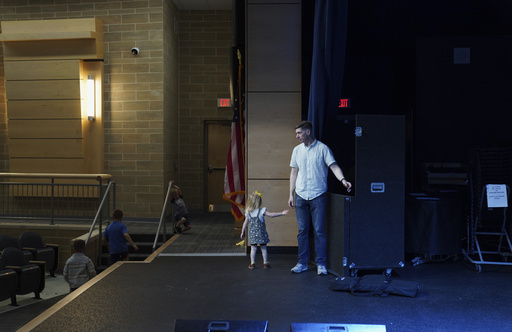In Fredericksburg, Virginia, Kat Renfroe discovered a path to meaningful involvement when she volunteered to tutor Afghan youth resettling in the United States. The opportunity, prompted by a church bulletin announcement, resonated with Renfroe due to her husband’s extensive military service in Afghanistan. Moved by his admiration for the Afghan people, she embraced the volunteer role, fundamentally altering the course of her life.
Seven years on, Renfroe maintains a close-knit relationship with the Afghan family she initially supported, forging a career dedicated to refugee aid. She now leads the local migration and refugee services at Fredericksburg, under the umbrella of Catholic Charities of the Diocese of Arlington. However, these vital efforts are jeopardized by policy changes introduced under President Donald Trump’s administration. When federal support and new refugee arrivals were halted, local resettlement agencies, much like Renfroe’s, encountered severe challenges and potential closure.
The effects are felt sharply in Virginia, a state deeply interwoven with military and Afghan communities. Rich in military history and influence, Fredericksburg—and Virginia at large—has welcomed more Afghan refugees per capita than any other state. Afghan culture has flourished locally, with markets, eateries, and school programs reflecting this vibrant community. Despite their integration, many Afghan families anxiously await the chance to reunite with overseas relatives, fearing their hopes are dashed by immigration restrictions.
The recent U.S. Conference of Catholic Bishops’ decision to end its long-standing refugee resettlement partnership with the federal government underscores the complex interplay between faith and policy. Although local Catholic Charities, like the Fredericksburg office, manage to continue operating thanks to diocesan and state aid, their future remains uncertain without federal backing.
Religious organizations have historically played a crucial role in U.S. refugee resettlement, with seven out of ten national partners previously being faith-based. Catholic Charities has devoted decades to this mission, beginning with Vietnamese refugees post-Saigon. In the past decade, Afghan refugees have become the primary clientele, particularly following the Taliban’s resurgence in 2021. St. Mary’s Church in Fredericksburg exemplifies this community-driven support, rallying volunteers to assist Afghan newcomers through practical aid and integration efforts.
Praise and commitment also resonate from Southern Baptist churches, such as Pillar Church, deeply embedded in military community life near Quantico. Joi Rogers, a member of Pillar and an organizer at a makeshift refugee camp, emphasizes the importance of service as both a religious and moral duty. Her husband, Jake Rogers, echoes this sentiment, emphasizing the church’s commitment to service that transcends political lines.
The community support extends beyond immediate resettlement needs. Pillar Church, for instance, responded rapidly to the refugee influx, establishing English classes and community engagement to ease transitions. The Williams family from Stafford opened their home to an Afghan teenager displaced by the turmoil in Kabul, nurturing her through her high school years and into adulthood.
For many, the dismantling of federal refugee programs is deeply disheartening, yet their resolve remains unshaken. Pastor Colby Garman of Pillar Church emphasizes the Biblical call to love one’s neighbor as a guiding principle for their continued support of refugees, even amidst political tensions.
The unity and compassion fostered through these faith communities reflect a powerful testament to shared values and common goals, transcending religious differences. At a Fredericksburg refugee office, a group of Afghan women gathered for a self-care session, their meeting further enhanced by a potluck celebrating the conclusion of Ramadan. Suraya Qaderi, a recent arrival, embodies the ongoing hope and resilience of these communities, having narrowly secured her resettlement before the suspension of new arrivals.
Despite political uncertainties, the dedication of individuals like Renfroe remains steadfast. Her work, rooted in Catholic beliefs, prioritizes continued support and outreach to refugee families, ensuring they feel valued and supported amidst an evolving landscape. Should circumstances require, she’s prepared to revert to volunteering, committed to sustaining these lifelines of community and care.


